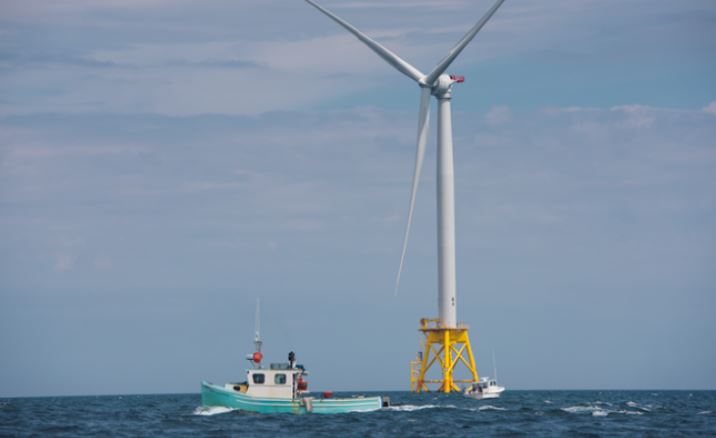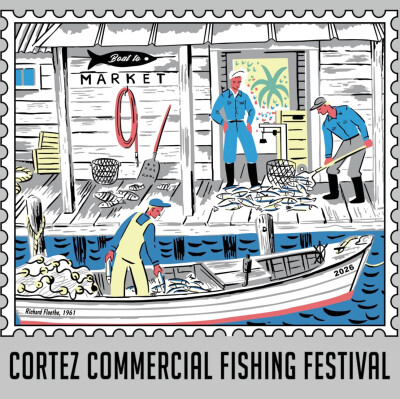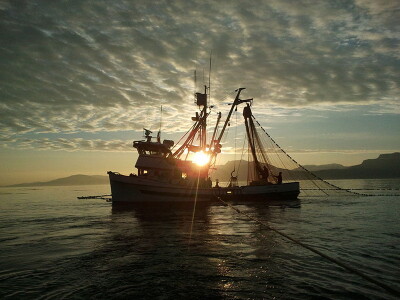East Coast fishermen told of their gear torn up by survey vessels working for offshore wind energy developers, as the federal Bureau of Ocean Energy Management opened its public process toward mitigating the newcomer industry’s effect on seafood providers.
Conch fisherman James Hahn said he witnessed a survey boat running over his trap lines off Maryland, and hailed the vessel on VHF radio.
“They said they had the right to survey,” Hahn told BOEM officials in an online Zoom meeting Monday. “I finally had to get in front and turn my boat sideways to get them to stop.”
Developers US Wind have notified fishermen in the Delmarva region that more survey work is scheduled in December and gear conflicts are possible, said Hahn.
“That’s not how you work with fishermen,” he said. “They’re basically taking over the ocean and don’t give two shits about us anymore.”
The gear conflicts are making it harder for BOEM and the wind industry to work with fishermen, warned Fred Mattera of the Commercial Fisheries Center of Rhode Island.
“There has to be accountability,” said Mattera. BOEM’s use of email updates an online meetings is not reaching enough fishermen to give the agency a complete picture of the changes offshore wind will impose on the industry, he said.
“Workshops provide an opportunity where we can get people into a room,” he said.
The Monday online session was focused on fixed gear, such as fish traps and gillnets, one in a series that BOEM’s chief of renewable energy Jim Bennett said is the prelude to developing “a clear process for fisheries mitigation by summer 2022.” The agency plans to put out a draft guidance document in the spring, he said.
The aim is to “avoid, minimize and compensate for” the effects of developing offshore wind turbine arrays on fishing businesses, said BOEM analyst Brian Hooker.
But he said BOEM does not have the power to set up a federal or regional mitigation plan; its guidance will apply only to individual offshore wind projects.
The overall impact will be immense, said Meghan Lapp of Seafreeze Ltd., a Rhode Island squid processor.
“The Rhode Island (mitigation) process was a joke,” with estimated reimbursement far below projected losses in revenue, said Lapp. The industry will “need 100 percent compensation from the projects that BOEM has approved or will approve in the future,” she added.
With likely construction timelines extending eight to 10 years for southern New England projects, “you won’t be able to fish there,” said Lapp. “BOEM is rushing through this compensation process without one workshop.”
Displacement of fishing effort — forcing fishermen to leave areas as turbines are built — is a big worry.
“When one group is displaced — and this is the way it’s always been — they’re going to displace another group, like a domino effect,” said Kevin Wark, a Barnegat Light, N.J., gillnet captain. “Every fishery has a footprint out there, and I cannot stress that enough.”
Wark said he worries about shocks to the industry infrastructure as well.
“Are we going to be able to survive a bad year, while everyone figures out how to fish around these things?” he said. “Everyone knows property values are through the roof. How long will it be until there’s a bar and a sportfish marina where our fish house used to be?”
Wark advocates automatic identification system (AIS) transponders on every turbine tower for safe navigation. Without it, “if I need to declutter (the radar image) it will lose some of the fine-scale targets, and that’s a problem,” he said.
Fishermen said their experiences with survey vessels don’t bode well for future relations. Mid-Atlantic black sea bass trap fisherman Joe Wagner said he first lost pots to a survey tow about three years ago, and another 100 more recently that he did not file a claim for based on his earlier experience with developers.
“If you displace me from that bottom, I’m going to have to move my gear down on someone else’s,” he said. “You ought to put these things (turbines) about a mile off the beach, where none of us fish.”
Off the east end of Long Island, N.Y., fishermen have been trying to get compensation from wind developers for gear losses, said Bonnie Brady, executive director of the Long Island Commercial Fishing Association.
When those disputes arise, “there’s no disclosure by the developers,” said Brady. “They give you nothing.”
Brady helped one lobster fishermen with a claim for $1,800 for two lost trap trawls. In response, he got a 10-page reply from a third-party consultant who claimed the survey vessel was nowhere near his gear, she said.
With the burden of proof thrown on fishermen, “it’s basically pin-the-tail on the survey boat,” she added.
In Denmark — home of wind developer Ørsted — fishermen are compensated for loss of access to fishing grounds, “clearly better than what we have here, which is nothing,” said Brady.
“They have a statutory requirement that we don’t have,” replied BOEM analyst Hooker.
New Jersey captain Brick Wenzel said he hears fishermen and survey captains arguing on VHF channel 16.
“Imagine what it’s going to be like when you have hundreds of vessels” working around wind turbine projects, he said.







